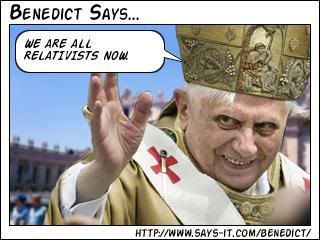A Humanist school chaplain?
On the subject of threats to the separation of church and state in Australia, you might recall that last year the Howard Government announced the National School Chaplaincy Programme, which "will provide annual support of up to $20,000 for government and non-government school communities seeking to establish school chaplains or to further enhance services already being provided," commencing in the 2007 school year.
The National School Chaplaincy Programme aims to support school communities that wish to access the services of a school chaplain. School chaplains are already making valuable contributions to the spiritual and emotional wellbeing of school communities across Australia and the Australian Government has responded to the call that their services be made more broadly available.
The government website doesn't spell out exactly what "spiritual wellbeing" is, nor how it might be measured, but perhaps a more keen-eyed reader than myself can locate this information for me. The programme sponsors chaplains across the spectrum of belief in Australia--Anglicans, Baptists, Buddhists, Catholics, Church of Christ, Hindus, Muslims, Jehovah's Witnesses, Jews, Lutherans, Orthodox, Pentecostals, Presbyterians, Salvos, Uniting Church and "Others"--but it is unclear whether the "Other" category includes atheists and humanists (or Pastafarians). According to Education Minister Julie Bishop, it's all part of the drive to get "values" into Australian public schools--"values" being the sole province of the religious, you see.
It might surprise you to learn, therefore, that humanist chaplains do exist--though whether they would qualify for funding under the Howard Government programme is another matter. In an interview with the Institute for Humanist Studies, the Humanist Chaplain at Harvard University, Greg Epstein, described what his job entails:
It is certainly a unique job, and most people really don't know that there has been a humanist chaplain here at Harvard for over 30 years now. A lot of people are curious: what exactly does a Humanist chaplain do? We like to say that the Humanist chaplaincy is dedicated to building, educating and nurturing a diverse community of humanists, agnostics, atheists and the non religious at Harvard and beyond.Nurturing is a very important aspect of chaplaincy work. People have real emotional needs around issues of birth, death, struggles in life, depression, anxiety, but also the joys of life having somebody to share those with, having a community of people to share those with. So I do a lot of counseling for people around both the happy and the sad times in life.
[. . .]
"Is humanism a religion?" is certainly a question that comes up a lot. I think that humanism is a life stance. A life stance is something that functions sociologically like a religion it's role in people's lives, the way that people draw on humanism as an inspiring life stance meaning that it is not just a philosophy. Humanism is not just what we think, it is not just our abstract ideas about the nature of the universe. It is also the way that we live on a day to day basis.The reason we have a chaplaincy here at Harvard, is to acknowledge that this is a broad and diverse community where people have real, everyday, day to day needs beyond simply answering academic questions in the laboratory or in the classroom. Whether you happen to believe in God or not, you still have those kinds of needs, and there needs to be an institution that is dedicated to serving people in their struggles with those needs, in their dealing with those needs.
The rest of the interview can be found here. Epstein has a bit of a dig at the "New Atheists" (i.e. Richard Dawkins, Daniel Dennett and Sam Harris), asking "don't you think human life is about more than just science?" (Do they really suggest otherwise, though?) He sees humanist chaplains as part of a larger project to build a humanist community and institutions, and he also thinks humanists should get together and sing.
We also need to sing. We need to make the experience of being part of the humanist community sing, on a metaphorical level, to be able to read poetry together, and to sort of see the emotional side of life. But we also need to sing literally. Like you said, with Julia, to have those choruses. A song like John Lennon's "Imagine," great example.
In short, Epstein seems like a really, really annoying person. But perhaps he serves as a model for the kind of chaplain that those "values neutral" humanist and atheist students in high schools should, by rights, be granted access to under the Howard Government's chaplaincy programme.

















|